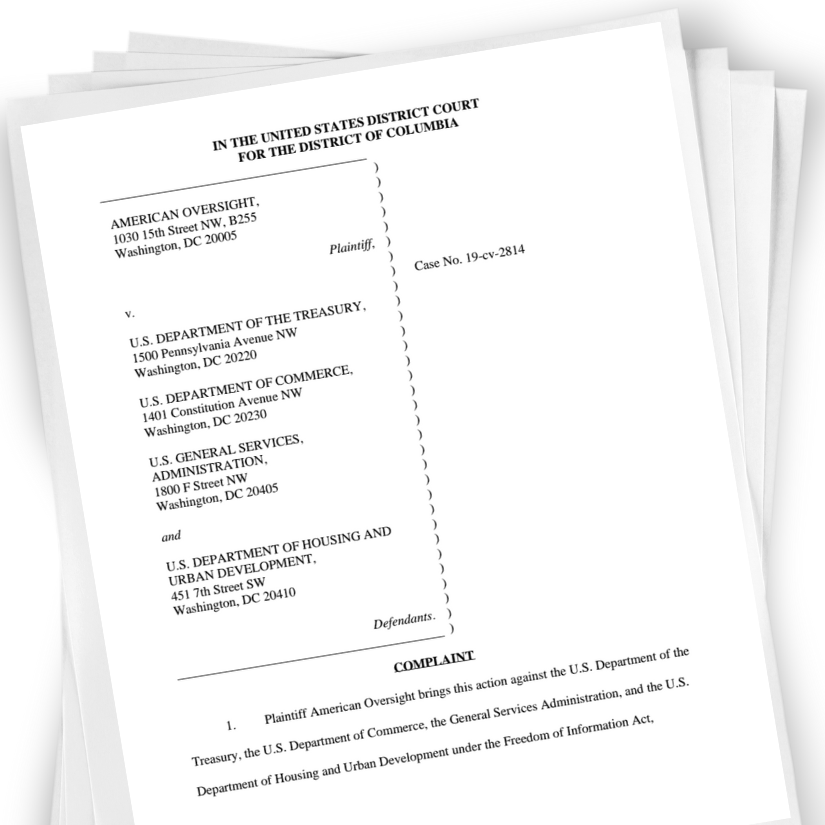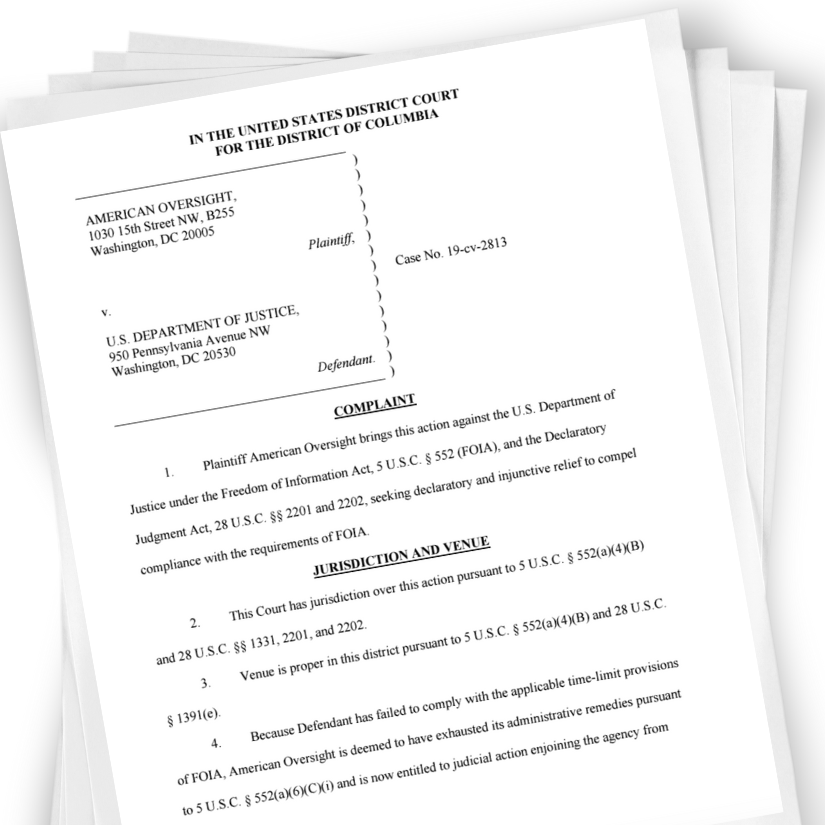
News Roundup: Trump, Giuliani, and Ukraine
“Unprecedented” is a word that has been used a lot in the past few years — including this week.

“Unprecedented” is a word that has been used a lot in the past few years. It describes President Donald Trump’s financial conflicts of interest, his administration’s close ties to industry and special interests and its attacks on voting rights. And on Thursday, House Intelligence Committee Chair Adam Schiff used the word to describe the refusal by the acting director of national intelligence to share with Congress a “potentially explosive” whistleblower complaint.
A week ago, Schiff issued a subpoena to Joseph Maguire, the acting director, to compel the release of the complaint, which last night was reported to involve Trump’s communications with Ukrainian President Volodymyr Zelensky. Intelligence Community Inspector General Michael Atkinson had reviewed the complaint and marked it as being of “urgent concern,” a threshold requiring notification of congressional oversight committees. Maguire’s refusal to cooperate, Schiff said, was “because he is being instructed not to, that this involved a higher authority.”
The Ukrainian government, of course, has been the target of efforts by the president’s personal attorney, Rudy Giuliani, who has been publicly pushing Ukraine to investigate the son of former vice president and Trump’s potential election opponent Joe Biden. Last month, Giuliani secretly talked to a Ukrainian official with the help of the State Department, and the administration held up $250 million in military aid to Ukraine before backing off last week and allowing the aid package to be released.
American Oversight has filed numerous Freedom of Information Act requests to learn more about Giuliani’s efforts on behalf of the president and the extent to which he was aided by administration officials. Today, in light of the news, we filed a request for them to be processed on an expedited basis.
Meanwhile, the contents of the complaint — and of the “promise” Trump reportedly made to a foreign leader — are unknown as of Friday afternoon, including to congressional oversight committees.
The White House’s resistance to congressional oversight is, yes, unprecedented. Trump has publicly vowed to fight “all the subpoenas,” and White House counsel has said that current and former administration officials would not be permitted to testify before Congress.
In June, American Oversight launched our investigation of the executive branch’s obstruction of Congress’ constitutionally mandated oversight, and the failure of multiple agencies to turn over documents prompted us to sue the administration this week for the records. We filed lawsuits against the General Services Administration and the Departments of Commerce, Justice, Housing and Urban Development, and the Treasury, seeking communications with agency officials and the White House counsel’s office about congressional investigations.
Here’s what else has happened this week, as we investigate the — routinely unprecedented — wrongdoing of the Trump administration:
Kobach’s Emails to ICE: The Kansas City Star reported this past week on emails we obtained that show that former Kansas Secretary of State Kris Kobach attempted in 2017 to use his connections at U.S. Immigration and Customs Enforcement (ICE) to find out the immigration status of nearly 300 Nebraska residents. Kobach, who was trying to enforce a local ordinance prohibiting landlords from renting to undocumented immigrants, also hinted that the agency could use the information for enforcement actions. You can read more here.
Kavanaugh Investigation: According to new reporting on the FBI’s investigation into Supreme Court Justice Brett Kavanaugh’s alleged past sexual misconduct, the FBI failed to interview more than two dozen people whose names were provided by the lawyers of Deborah Ramirez, a Yale classmate who said that Kavanaugh had exposed himself to her at a party. The reporting also found that the FBI was told of a second allegation, not made public before Kavanaugh’s confirmation vote, but that the bureau did not investigate it. We’ve requested an expedited review of a FOIA request for information about the interviews the FBI did conduct in its investigation.
Abuse of Pardon Power: Last month’s revelations that Trump had promised pardons for subordinates who break the law in his push to fast-track border-wall construction wasn’t the first time news broke of his potential abuse of presidential pardon powers. Back in June, we filed a FOIA request for information about a meeting Trump had with Acting Homeland Security Secretary Kevin McAleenan, in which he reportedly made a similar promise. We’ve asked the Department of Homeland Security and the Army Corps of Engineers for communications related to “pardons” or “clemency.”
EEOC Staffing: According to documents obtained by American Oversight, the number of Equal Employment Opportunity Commission investigators who look into civil rights complaints has dropped to its lowest in at least nine years. Politico reported on the decline.
“Hill Stunt”: That’s how Homeland Security officials dismissed Senator Jeff Merkley’s 2018 visit to a migrant detention facility. We found emails exchanged by multiple DHS officials, including then-Secretary Kirstjen Nielsen, about the visit.
Congress Investigates Chao: This week, the House Oversight Committee sent a letter to Transportation Secretary Elaine Chao indicating that it is investigating “several allegations” of conflicts of interest. We have her calendars, which show that her actions on behalf of her family’s shipping company included a photo session with her father at the Transportation Department, and we uncovered evidence that her office had coordinated with the office of her husband, Senate Majority Leader Mitch McConnell, to give preferential treatment to Kentucky-specific requests.
Texas Elections Officials: We obtained new documents that offer an inside look at the troublingly close relationships between Texas election officials and voting-restriction advocates, including emails from Hans von Spakovsky, who runs the Heritage Foundation’s Election Law Reform Initiative. Spakovsky asked the Texas secretary of state’s office for help with his organization’s “ongoing election integrity initiative,” a database of alleged examples of voter fraud.
NRA Influence: Despite the ongoing gun violence crisis, and the all-too-frequent mass shootings that capture the nation’s attention, federal inaction on gun control remains the norm — a sign of the National Rifle Association’s continued power and influence. We’ve filed FOIA requests with the Department of Health and Human Services for officials’ communications with NRA representatives.
Trump’s Interference at the Fed: As the Federal Reserve moved to lower interest rates this week, Chairman Jerome Powell has had to contend with more angry tweets from the president. Trump’s tweet accusing Powell of lacking “guts” and “vision” is not the first such attack on the chairman, and JPMorgan Chase has even created a volatility index called the “Volfefe Index” to quantify the effect these tweets and others can have on financial markets. We want to know how Fed officials are reacting to these tweets, and filed a FOIA request for communications.
Anti-Muslim Influence: Along with the Southern Poverty Law Center, we’re investigating whether the work of USAID political appointee John Barsa, who previously worked on anti-terrorism at the Department of Homeland Security, has been influenced by anti-Muslim and anti-immigrant groups. Barsa reportedly played a role in the decision to cut a grant for a Muslim-American advocacy group, and is married to a lobbyist for ACT for America, a group SPLC has found pushes anti-Muslim conspiracy theories and conflates mainstream and radical Islam.
Anti-Discrimination Protections: In August, lawmakers wrote to the Consumer Financial Protection Bureau for information about a new proposal that would exempt financial technology companies from complying with consumer protection and anti-discrimination laws. We’re asking for any CFPB communications with anti-LGBTQ groups to see whether outside entities influenced this decision.

